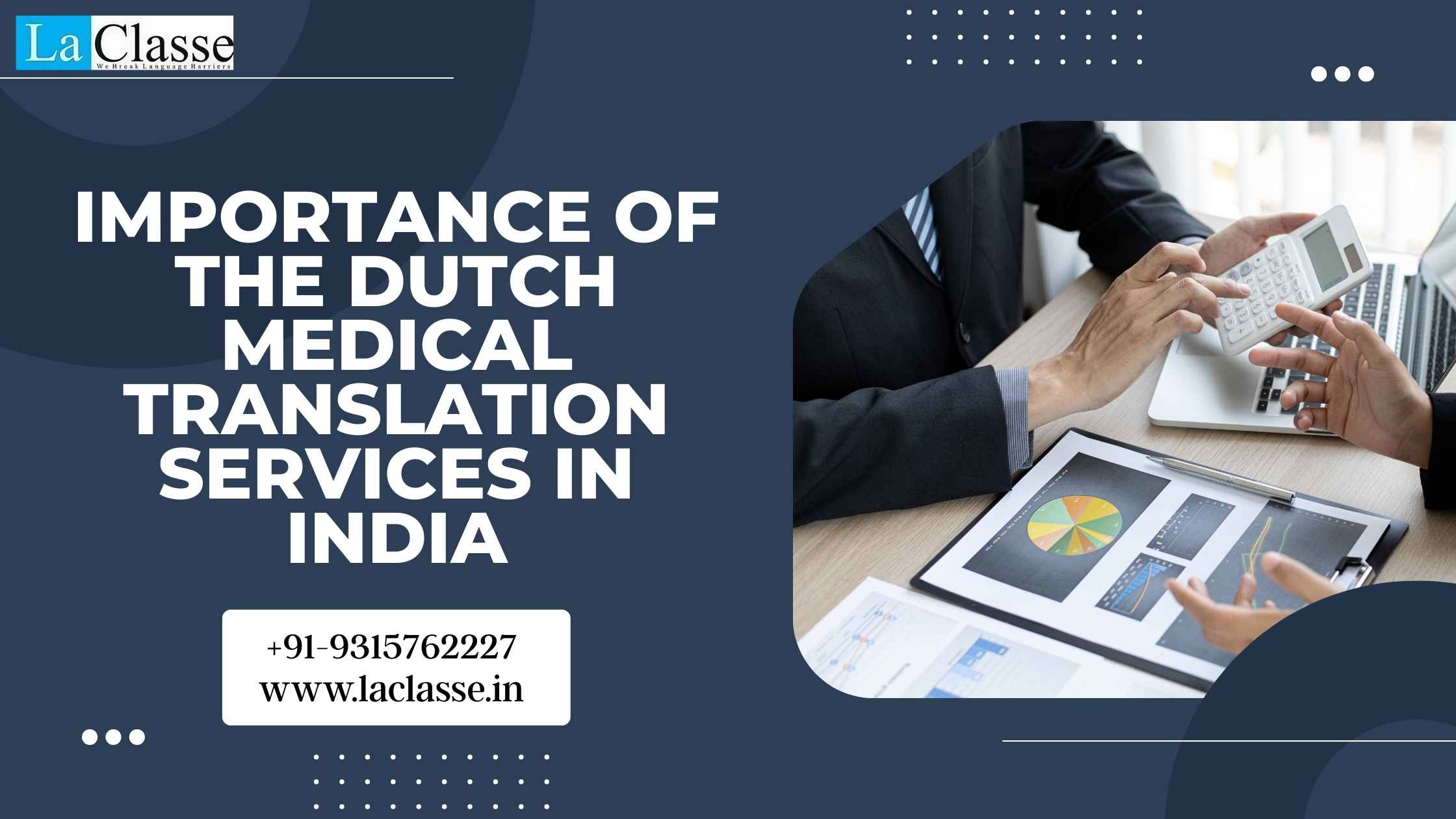In today’s interconnected healthcare ecosystem, Dutch medical translation services in India play a vital role in ensuring accurate communication between healthcare providers, patients, and medical institutions. With the globalization of medical services, Indian hospitals, pharmaceutical companies, and research organizations increasingly collaborate with Dutch-speaking clients, partners, and institutions. This makes precise translation of medical documents essential for patient safety, regulatory compliance, and effective healthcare delivery.
Medical translation is not simply about converting words from one language to another—it requires specialized knowledge of medical terminology, cultural sensitivity, and compliance with international standards. A minor error in translating medical content can lead to misdiagnosis, incorrect treatment, or legal complications.
This blog explores the importance of Dutch medical translation services in India, the types of medical documents that require translation, challenges faced, and benefits of hiring professional translation providers.
Why Dutch Medical Translation Services Are Important
1. Patient Safety and Accurate Healthcare Delivery
Healthcare providers often treat patients from diverse linguistic backgrounds. Accurate translation of medical reports, prescriptions, treatment plans, and patient instructions ensures that Dutch-speaking patients understand their diagnosis and treatment clearly. Misinterpretation can lead to serious health risks, medication errors, or complications.
2. Global Research and Clinical Trials
Pharmaceutical companies and research institutions frequently conduct clinical trials across multiple countries. Translating clinical trial protocols, patient consent forms, questionnaires, and research papers into Dutch is essential for:
- Ensuring participants fully understand the process
- Complying with local regulations
- Maintaining accuracy in clinical research data
3. Regulatory Compliance
Medical documents must meet the requirements of regulatory authorities. Dutch medical translation ensures compliance with standards set by organizations such as EMA (European Medicines Agency), Dutch health authorities, and other international bodies. Certified translation of drug labels, clinical data, and regulatory submissions is mandatory for legal acceptance.
4. Medical Tourism and Patient Communication
India is a major hub for medical tourism, attracting Dutch-speaking patients for specialized treatments. Hospitals and clinics require translation of:
- Medical records and prescriptions
- Patient consent forms
- Billing and insurance documents
Accurate Dutch translations ensure clear communication, enhance patient trust, and reduce potential misunderstandings.
5. Cross-Border Collaboration
Hospitals, pharmaceutical companies, and research organizations collaborate globally. Dutch medical translation is essential for:
- Training materials and standard operating procedures
- Technical documents and equipment manuals
- Research collaborations and knowledge sharing
Accurate translation fosters smooth cooperation and enhances credibility in international partnerships.
Types of Medical Documents That Require Dutch Translation
Professional Dutch medical translation services cover a wide range of documents:
1. Clinical Documents
- Patient medical histories and records
- Laboratory test results and diagnostic reports
- Prescriptions and treatment plans
- Discharge summaries and progress notes
2. Pharmaceutical Documents
- Drug labels and packaging instructions
- Clinical trial protocols and consent forms
- Regulatory submission documents
- Safety and pharmacovigilance reports
3. Medical Device Documentation
- User manuals and operating instructions
- Installation and calibration guidelines
- Maintenance and safety manuals
- Training materials for medical staff
4. Healthcare Communication and Marketing
- Hospital brochures and pamphlets
- Patient awareness campaigns
- Medical websites and digital portals
- Health education content
5. Research and Academic Documents
- Research papers and scientific journals
- Conference presentations
- Thesis and dissertations
- Clinical trial reports
Challenges in Dutch Medical Translation
Medical translation is highly specialized due to its technical and sensitive nature. Challenges include:
- Complex Medical Terminology – Accurate translation of specialized terms is critical.
- Cultural Sensitivity – Patient communication must respect cultural nuances.
- Regulatory Requirements – Different countries have specific translation standards.
- Formatting and Layout – Maintaining the structure of clinical documents, tables, and charts is crucial.
- Confidentiality – Patient data and research information require secure handling.
Benefits of Hiring Professional Dutch Medical Translation Services
- Accuracy and Precision – Ensures correct interpretation of medical terminology.
- Regulatory Compliance – Certified translations meet legal and healthcare authority requirements.
- Cultural Relevance – Content is adapted to the target audience for clear understanding.
- Confidentiality and Data Security – Sensitive patient and research data are protected.
- Time-Efficient – Quick turnaround for urgent medical translation needs.
- Expertise Across Medical Domains – Translators experienced in clinical, pharmaceutical, and technical fields ensure high-quality translations.
Industries That Require Dutch Medical Translation Services
- Hospitals and Healthcare Providers – Patient communication and medical record translation
- Pharmaceutical Companies – Drug labels, clinical trials, and regulatory submissions
- Medical Device Manufacturers – Manuals, safety instructions, and training guides
- Research Institutions – Scientific papers, clinical reports, and academic studies
- Medical Tourism Sector – Patient guides, consent forms, and treatment plans
How to Choose the Right Dutch Medical Translation Provider
- Check Credentials and Certification – Ensure translators are certified and recognized by medical and regulatory authorities.
- Domain Expertise – Look for professionals experienced in clinical, pharmaceutical, and medical device translation.
- Confidentiality Policies – NDAs and secure handling of sensitive medical data are essential.
- Quality Assurance Processes – Multiple review stages ensure accurate, error-free translations.
- Timely Delivery – Providers should meet urgent deadlines without compromising quality.
- Technological Proficiency – Ability to work with medical software, electronic health records, and document formats like PDF, Word, and Excel.
Conclusion
The importance of Dutch medical translation services in India cannot be overstated. Accurate translation of clinical documents, pharmaceutical records, medical device manuals, and research papers ensures patient safety, legal compliance, and successful international collaboration.
Professional translation services not only provide linguistic expertise but also offer technical knowledge, cultural understanding, and regulatory awareness. For Indian healthcare providers, pharmaceutical companies, and research institutions collaborating with Dutch-speaking partners, investing in expert Dutch medical translation services is essential for delivering high-quality care, ensuring compliance, and fostering trust in global medical partnerships.
Phone: +91-9315762227
Mail: manohar.roshan@laclasse.in
Website: https://www.laclasse.in/

